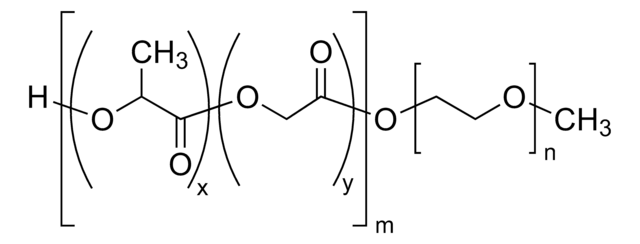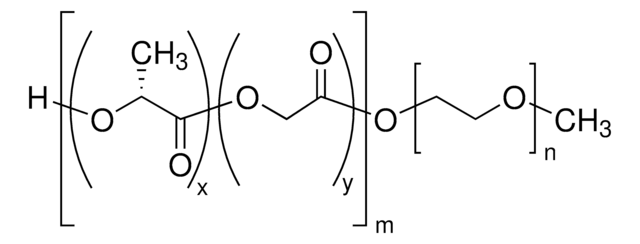765139
Poly(ethylene glycol) methyl ether-block-poly(lactide-co-glycolide)
PEG average Mn 5,000, PLGA Mn 7,000
Synonym(s):
PEG-PLGA, Polyethylene glycol, mPEG-b-PLGA
About This Item
Recommended Products
form
solid
feed ratio
lactide:glycolide 50:50
mol wt
PEG average Mn 5,000
PLGA Mn 7,000
average Mn 12,000 (total)
degradation timeframe
1-4 weeks
transition temp
Tg 24 °C
Tm 38-43 °C
PDI
<2.0
storage temp.
2-8°C
Looking for similar products? Visit Product Comparison Guide
General description
Application
Features and Benefits
- Good biocompatibility, low immunogenicity and good degradability.
- Properties can be easily modulated by changing the block copolymer segment sizes to suit a particular application.
Storage Class Code
11 - Combustible Solids
WGK
WGK 3
Flash Point(F)
No data available
Flash Point(C)
No data available
Choose from one of the most recent versions:
Already Own This Product?
Find documentation for the products that you have recently purchased in the Document Library.
Customers Also Viewed
Articles
Local delivery of bioactive molecules using an implantable device can decrease the amount of drug dose required as well as non-target site toxicities compared to oral or systemic drug administration.
Microparticle drug delivery systems have been extensively researched and applied to a wide variety of pharmaceutical and medical applications due to a number of advantages including injectability, local applicability to target tissues and sites, and controlled drug delivery over a given time period.
Aliphatic polyesters such as polylactide, poly(lactide-co-glycolide) and polycaprolactone, as well as their copolymers, represent a diverse family of synthetic biodegradable polymers that have been widely explored for medical uses and are commercially available.
The development of drugs that target specific locations within the human body remains one of the greatest challenges in biomedicine today.
Our team of scientists has experience in all areas of research including Life Science, Material Science, Chemical Synthesis, Chromatography, Analytical and many others.
Contact Technical Service






